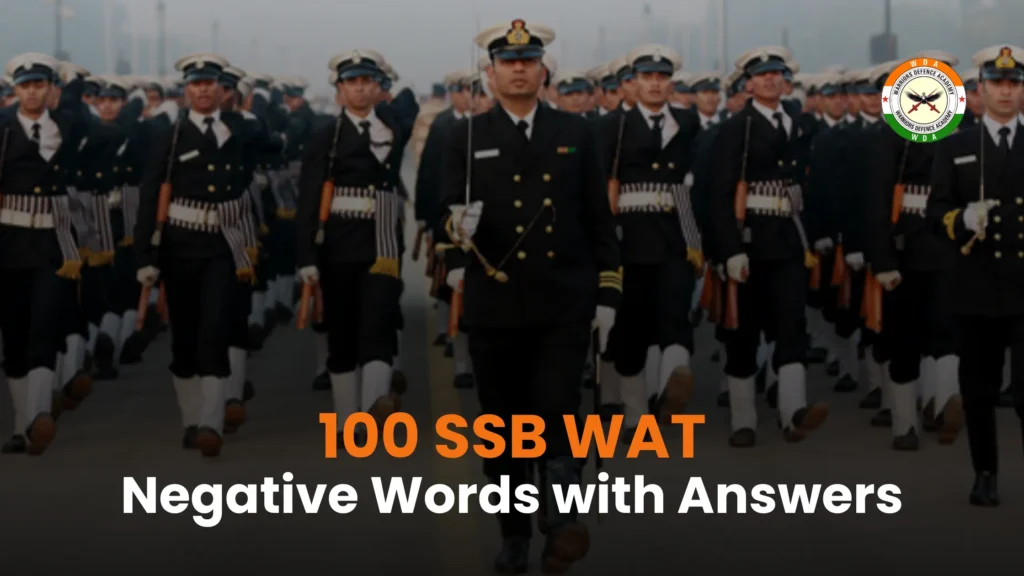SSB WAT Negative Words: The Word Association Test (WAT) is one of the most challenging and significant tests in the Services Selection Board (SSB) interview. It assesses a candidate’s subconscious thoughts, personality traits, and decision-making abilities. The test presents 60 words, each appearing for 15 seconds, and the candidate must form a meaningful sentence using the word.
A common challenge in WAT is dealing with negative words effectively. Instead of reflecting negativity, candidates should convert them into positive, constructive, or neutral statements that showcase optimism, leadership, and problem-solving skills. In this blog, we provide 100 SSB WAT Negative Words with Answers to help you ace the SSB WAT.
What is the Word Association Test (WAT)?
The Word Association Test (WAT) is a psychological test used to assess a candidate’s thought process, personality, and behavioral patterns. In the WAT, candidates are shown a series of words, and they have to respond with the first word that comes to their mind. The test is designed to evaluate a candidate’s mental agility, creativity, and emotional stability.
What is the Importance of WAT in SSB?
- Evaluates Personality Traits – Assesses your mindset, confidence, and leadership qualities.
- Judges Mental Toughness – Determines how you handle pressure and negative situations.
- Analyzes Spontaneity – Tests your ability to think quickly and constructively.
- Assesses Communication Skills – Ensures clarity and conciseness in expressing thoughts.
- Helps in Officer-Like Qualities (OLQs) Assessment – Essential for leadership, responsibility, and decision-making.
Why are Negative Words Important in the WAT?
SSB WAT Negative Words play a significant role in the WAT, as they help assess a candidate’s ability to think positively and respond constructively to challenging situations. When faced with SSB WAT Negative Words, candidates must demonstrate their capacity to manage stress, think critically, and respond with a positive or neutral word.
100 SSB WAT Negative Words with Answers
- Abuse – Good manners eliminate the need for abuse.
- Accident – Road safety awareness prevents accidents.
- Afraid – Courage overcomes fear.
- Alone – Solitude enhances self-reflection.
- Anger – Self-control channels anger into productivity.
- Anxiety – Preparation reduces anxiety in challenges.
- Argument – Healthy arguments lead to better solutions.
- Arrogance – Humility is the key to true leadership.
- Avoid – Wise decisions help avoid unnecessary conflicts.
- Bankrupt – Hard work and strategy rebuild finances.
- Battle – Strategy and courage win battles.
- Betray – Trust and loyalty strengthen relationships.
- Blame – Responsibility is more important than blame.
- Break – Short breaks improve efficiency.
- Burden – Challenges are opportunities for growth.
- Chaos – Discipline brings order to chaos.
- Cheat – Honesty earns long-term success.
- Crime – Law and order maintain peace.
- Crisis – Smart decisions turn crises into opportunities.
- Criticize – Constructive criticism enhances performance.
- Damage – Quick actions prevent further damage.
- Danger – Awareness and preparedness ensure safety.
- Dark – Darkness highlights the value of light.
- Death – Good deeds create a lasting legacy.
- Defeat – Learning from defeat ensures future victory.
- Delay – Proper planning eliminates delays.
- Depressed – Staying active keeps depression away.
- Difficult – Hard work makes difficult tasks easy.
- Disaster – Quick response minimizes disaster impact.
- Discipline – Discipline leads to excellence.
- Disrespect – Mutual respect strengthens relationships.
- Doubt – Confidence overcomes doubt.
- Dull – Creativity adds excitement to life.
- Embarrass – Learning from mistakes avoids embarrassment.
- Enemy – Understanding turns enemies into allies.
- Escape – Facing challenges is the key to success.
- Evil – Good deeds overpower evil.
- Excuse – Responsibility removes the need for excuses.
- Exhausted – Proper rest restores energy.
- Explosion – Proper precautions prevent explosions.
- Failure – Learning from failure leads to success.
- Fear – Facing fears builds courage.
- Fight – Fighting for justice is necessary.
- Fool – Learning prevents repeated mistakes.
- Force – Knowledge is a greater force than power.
- Forget – Important lessons should never be forgotten.
- Frustration – Patience turns frustration into progress.
- Frightened – Preparation eliminates fear.
- Gamble – Wise investments are better than gambling.
- Grief – Time and support heal grief.
- Guilt – Accepting mistakes leads to improvement.
- Hate – Love and understanding overcome hatred.
- Helpless – Seeking help solves helplessness.
- Hopeless – Hard work turns hopelessness into hope.
- Hunger – Proper planning eliminates hunger.
- Humiliate – Respect builds strong relationships.
- Ignore – Attention to detail prevents ignorance.
- Illness – Healthy habits prevent illness.
- Imperfect – Practice leads to perfection.
- Impossible – Smart work makes impossible possible.
- Insecure – Self-belief removes insecurity.
- Insult – Politeness neutralizes insults.
- Jail – Law enforcement maintains order.
- Jealousy – Hard work replaces jealousy with achievement.
- Kill – Protecting lives is the ultimate duty.
- Lack – Hard work fulfills all needs.
- Lazy – Activity keeps laziness away.
- Lie – Honesty is the best policy.
- Lonely – Engaging in hobbies eliminates loneliness.
- Loss – Every loss teaches a valuable lesson.
- Mad – Creativity turns madness into brilliance.
- Manipulate – Ethical influence leads to trust.
- Misery – Helping others reduces misery.
- Mistake – Learning from mistakes leads to success.
- Murder – Law ensures justice.
- Nervous – Confidence replaces nervousness.
- Nightmare – Good habits eliminate nightmares.
- No – Saying no to negativity is wise.
- Obnoxious – Kindness neutralizes rudeness.
- Pain – Strength comes from enduring pain.
- Panic – Staying calm overcomes panic.
- Poverty – Education and effort eliminate poverty.
- Pressure – Pressure molds a person into a leader.
- Prison – Discipline prevents prison time.
- Problem – Every problem has a solution.
- Quit – Winners never quit.
- Revenge – Forgiveness is stronger than revenge.
- Risk – Calculated risks lead to success.
- Rough – Challenges make life interesting.
- Ruined – Wise decisions prevent ruin.
- Sad – Happiness follows hard times.
- Selfish – Helping others is the best policy.
- Sick – Good health habits prevent sickness.
- Stress – Planning reduces stress.
- Struggle – Struggles shape a strong personality.
- Stupid – Learning makes people smarter.
- Tragedy – Strength helps overcome tragedies.
- Ugly – Kindness enhances beauty.
- Weak – Hard work converts weakness into strength.
- Worry – A positive mindset removes worries.
Tips to Crack the SSB WAT Negative Words
To perform well in the SSB WAT Negative Words, follow these tips:
- Practice regularly: Practice responding to negative words with positive or neutral words.
- Stay Calm and Composed: Take a deep breath and respond calmly to negative words.
- Think Positively: Focus on the positive aspects of a situation and respond with a positive word.
- Use Word Associations: Use word associations to connect negative words with positive or neutral words.
- Stay Focused: Stay focused and avoid distractions while responding to negative words.
Frequently Asked Questions (FAQs) – SSB WAT Negative Words with Answers
Q: What is the Word Association Test (WAT)?
A: The Word Association Test (WAT) is a psychological test used to assess a candidate’s thought process, personality, and behavioral patterns.
Q: Why are negative words important in the WAT?
A: Negative words help assess a candidate’s ability to think positively and respond constructively to challenging situations.
Q: How can I prepare for the WAT with negative words?
A: Practice regularly, stay calm and composed, think positively, use word associations, and stay focused.
Conclusion
The Word Association Test (WAT) is a critical component of the SSB interview, and responding to negative words is a crucial aspect of the test. By practicing with 100 SSB WAT negative words with answers, you can improve your ability to think positively and respond constructively to challenging situations. Remember to stay calm, think positively, and use word associations to crack the WAT with negative words.
Warriors Defence Day’s 21 Days SSB Interview Course

Warriors Defence Academy, renowned as the best SSB coaching institute in India, presents a holistic 21-day SSB Course designed to empower candidates with comprehensive and intensive preparation. Our expert guidance and mentorship encompass all stages of the SSB selection process, including:
- Screening rounds: OIR and PP&DT
- Psychological tests
- GTO obstacles
- Personal interview
Our 21-Day SSB Interview course prioritizes the overall development of our candidates, focusing on psychological, physical, emotional, and mental well-being. Our training modules are meticulously crafted to align with the armed forces’ selection parameters, ensuring a learning environment that nurtures both academic and personality growth.
Join Warriors Defence Academy’s 21-Day SSB Interview Course and unlock your potential to succeed in the SSB selection process.






